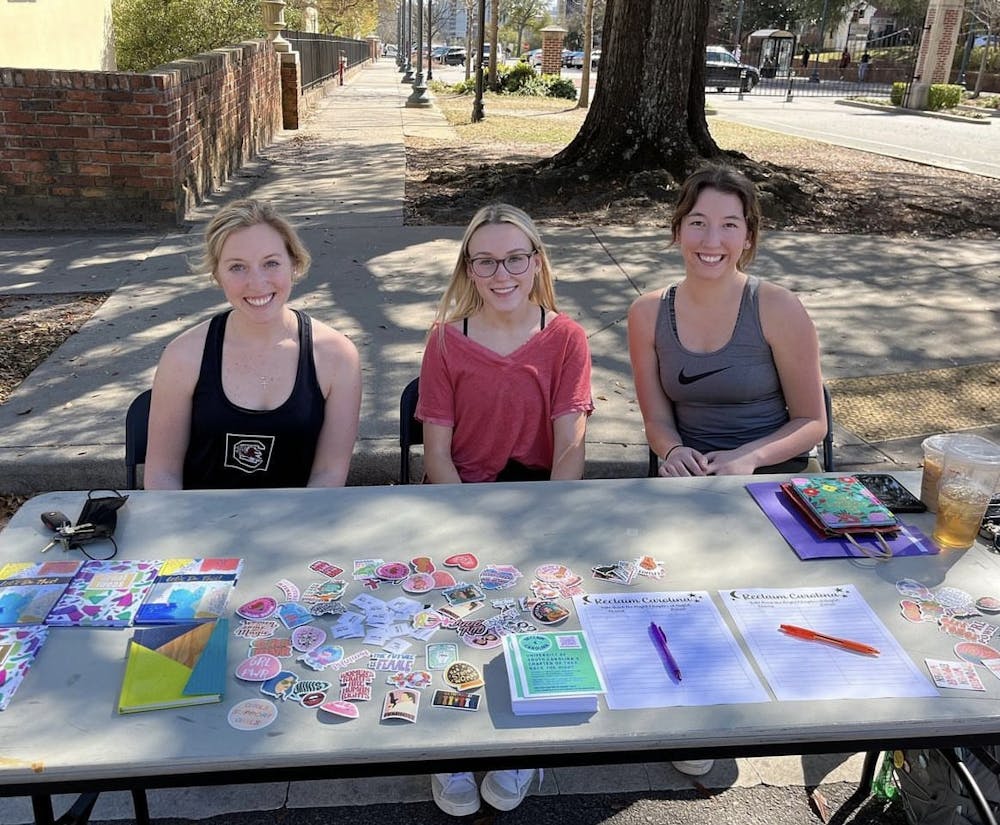A new club is participating in community events to help combat sexual assault at USC.
President Hannah Cella founded the club, Reclaim Carolina, after watching a documentary in her women and crime class. The documentary, "The Hunting Ground," is about sexual assault on college campuses.
“I saw that and wanted to make sure that there was a place for people on our campus to feel like they had solidarity because we have resources, but they're not necessarily pushed forward,” Cella, a first-year law student, said.
Cella said she felt there was a gap in education on sexual violence on campus, and the resources provided by the university were not well-known among students. Cella decided to fill the gap along with secretary Emily Haglund and vice president Kaitlyn Dewing.
The National College Health Assessment reported in 2021 that 5.6% of USC students experienced unwanted sexual touching without their consent, which is 1% above the national average. Despite these statistics, there were no student-led organizations on campus focused solely on combating sexual assault.
“We realized that there are a lot of issues that are kind of being normalized on campus, sexual assault being one of them, and that nothing’s really being done about it. So we figured if there’s anyone that’s going to start an organization, it might as well be us,” Haglund, a fourth-year criminal justice student, said.
By the end of the semester, the three students partnered with the Take Back the Night Foundation, an internationally recognized non-profit that was the first to spark a movement against sexual violence, and founded a chapter of the organization at USC. Take Back the Night provided guidance about advocacy and events the club could host, but Reclaim Carolina has been steadily expanding beyond those first parameters.
Since its founding, Reclaim Carolina has hosted booths at different events to educate students on sexual assault, domestic violence and the signs of potentially dangerous interpersonal relationships.
They have also worked in partnership with USC’s Sexual Assault and Violence Intervention Program, which has provided educational materials to the club and often hosts presentations in University 101 (U101) classes.
Cella said she hopes by having fellow students present this information, rather than a university-mandated U101 presentation, it will be more impactful.
"If you're listening to another student I feel like, to me, at least, that would be more impactful than just listening to someone come in and present," Cella said. “I just think that if it’s another person in your shoes, there’s so much more value added."
Reclaim Carolina also participated in the 16th Annual Mayor’s Walk Against Domestic Violence in October, and in April, the club plans to form a campus-wide team of students to participate in Pathways to Healing’s ‘Walk a Mile in Our Shoes’ event. The annual walk raises money for sexual assault survivors.
This is the first time the university will be participating in the event, and Reclaim Carolina has already started working with two service-learning honors courses to advertise the walk next semester.
Dewing, a first-year graduate student, said she hopes more people continue to join Reclaim Carolina and participate in even more fundraisers, walks and advocacy.
“It is a great way to really make a difference on campus because there is no other student-led organization that is focused on reducing instances of sexual assault on campus,” Dewing said.

